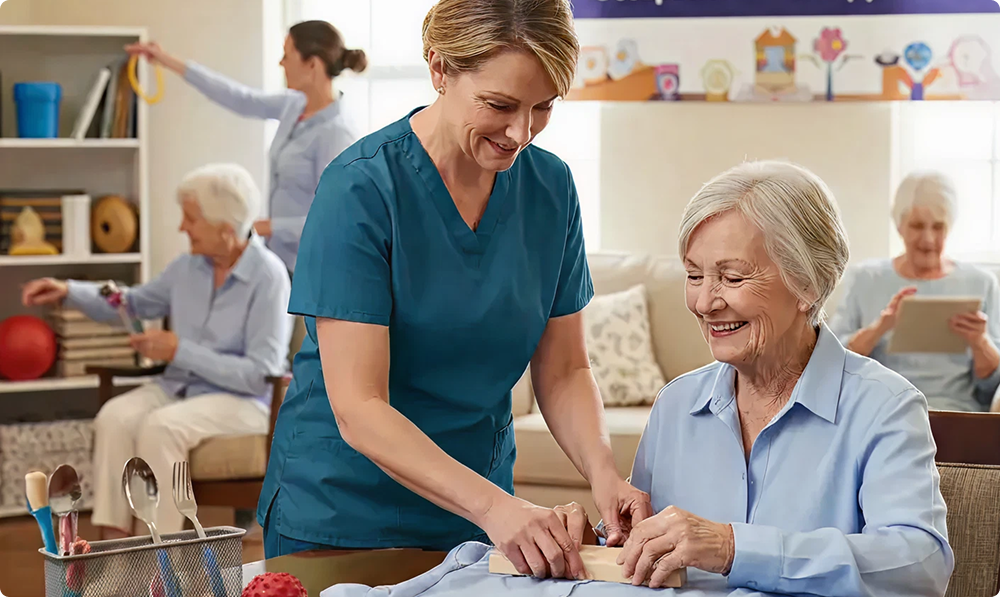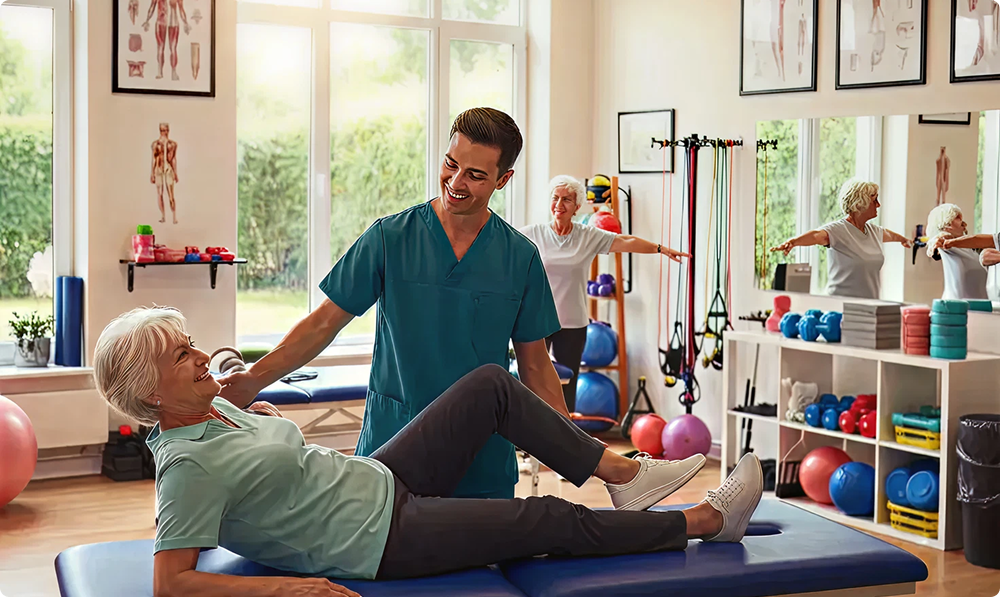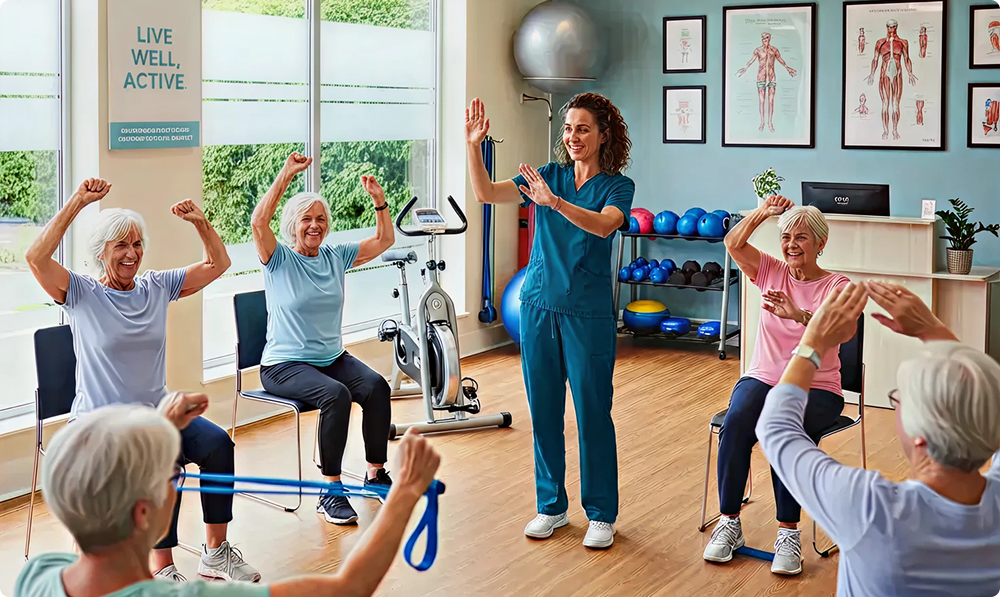Introducing The Connected Care Plan
Giving you the peace of mind having a dedicated, trusted health care professional watching out for your health, every step along the way.
Giving you the peace of mind having a dedicated, trusted health care professional watching out for your health, every step along the way.

Managing your health shouldn’t feel overwhelming. In a fragmented system where care is often disjointed and confusing, Connected Care provides older adults and their families with relief from stress, frustration, and uncertainty. Designed to simplify the aging journey, Connected Care offers a single, trusted point of contact who advocates for your ongoing care — bringing clarity, compassion, and consistency to every step.
Affordable and personalized, Connected Care helps you navigate appointments, services, and changing needs with confidence. We ensure nothing is missed, and no one feels alone in managing life at home. With Connected Care, you gain peace of mind knowing your care plan is always supported by a knowledgeable guide who understands your story — and stands with you.
With a single point of contact and monthly at-home visits, your care stays proactive, organized, and connected — monitoring your well-being and catching small changes in your health early, before they become more serious, while keeping you and your loved ones informed every step along the way.
So, whether you’re managing a condition, are simply wanting more regular oversight between doctor visits or need the help of a dedicated healthcare professional to help manage and coordinate your care, Connected Care can give you the clarity, confidence, and peace of mind you and your family have been looking for.
Plus, get a third month of Connected Care FREE as a bonus for signing up
A Connected Care visit is more than a check-in — it’s an essential step for staying healthy at home. Each month, your Clinical Leader visits your home to assess your well-being, monitor for new or changing needs, and look for early signs of concern. These check-ins help ensure your health, comfort, and safety are always supported.
Rather than rushing through a brief visit, your Connected Care clinical leader takes the time to really understand how you’re doing. They help manage day-to-day health concerns, review medications, and monitor your mobility. They can also identify environmental risks, such as clutter, fall hazards, or signs of difficulty managing daily tasks. Depending on your needs, they may suggest additional support like physiotherapy, occupational therapy, or household services.
Your Connected Care professional works as your long-term partner in aging well. Their consistent monthly visits create a system of early detection, informed decision-making, and personalized attention — giving you and your family peace of mind knowing someone is actively looking out for your health while you continue to age in place with confidence.

Each client’s health care needs are as unique as they are and that’s why we take the time to learn your needs from the first visit. These visits help determine the care plan you’ll receive and what matters most to you. We take a holistic approach to fully understand your needs and a Connected Care visit can be focused on any of the following:
Staying ahead of changes in your health is one of the most powerful ways to prevent complications. That’s why each Connected Care visit includes a focused review of your overall physical condition — from energy levels and mobility to breathing, heart health, and any subtle shifts that might signal something more serious. Your dedicated health care professional knows what to look for and takes the time to monitor early indicators that are often missed in quick appointments. When something needs attention, they communicate directly with your doctor or pharmacist, helping ensure nothing slips through the cracks. By identifying concerns early and coordinating the right next steps, Connected Care helps you avoid unnecessary emergencies and stay healthier, safer, and more confident at home.
Staying ahead of changes in your health is one of the most powerful ways to prevent complications. That’s why each Connected Care visit includes a focused review of your overall physical condition — from energy levels and mobility to breathing, heart health, and any subtle shifts that might signal something more serious. Your dedicated health care professional knows what to look for and takes the time to monitor early indicators that are often missed in quick appointments. When something needs attention, they communicate directly with your doctor or pharmacist, helping ensure nothing slips through the cracks. By identifying concerns early and coordinating the right next steps, Connected Care helps you avoid unnecessary emergencies and stay healthier, safer, and more confident at home.
Clinical Leaders also conduct an environmental assessment during each Connected Care visit, recognizing that early indicators of decline often present in the home before they appear clinically. They observe for changes such as increased clutter, difficulty maintaining household hygiene, expired or inadequate food supplies, or accumulating mail and unpaid bills — all of which signal emerging physical limitations, cognitive changes, or reduced capacity for daily functioning. Identifying these environmental risk factors allows the Clinical Leader to intervene early, communicate with family members when appropriate, and recommend additional supports or services to maintain a safe and stable home environment. This proactive monitoring is an essential part of ensuring clients can continue to live independently while reducing preventable safety risks.
As we age, changes in mobility can happen slowly — a bit more stiffness when bending, needing an extra hand when standing, or feeling slightly unsteady on familiar steps. These subtle shifts can be early signs of muscle loss, joint pain, bone fragility, or chronic conditions like arthritis, neurological disorders, or cardiovascular issues. During each Connected Care visit, your Clinical Leader looks closely for these changes, watching how comfortably you move and identifying anything that may put you at risk of a fall. By catching mobility issues early, they can help you strengthen your stability, recommend personalized strategies, or work with your doctor to address underlying concerns. It’s a proactive approach designed to keep you moving safely, confidently, and independently in the place you call home.
We also understand some of our client’s needs are more specialized, so as part of our holistic approach to care, we offer Occupational Therapy, Physiotherapy and Kinesiology services at a 10% discount when combined with your Connected Care Plan.
Managing medications can be one of the most challenging parts of staying healthy as we age, especially when prescriptions change or when multiple medications are involved. During each Connected Care visit, your Clinical Leader can take the time to review when and where medications should be taken, clarify instructions from your physician, and ensure you never run out of what you need. For clients living with Alzheimer’s or dementia — where remembering doses, timing, and purpose can feel overwhelming — this support becomes even more essential. Your Clinical Leader helps bring order and reassurance to the process, reducing the risk of errors and coordinating directly with your doctor or pharmacist when something needs attention. It’s compassionate oversight that keeps you safe, supported, and confidently on track with your health.
For clients who are unable multiple prescriptions, we can offer our CarePack™ service that provides the additional peace of mind of pre-sorting your medications and packaging them for you in convenient pouches. Each pouch is pharmacist approved before being sent out for delivery and accompanied by a summary of your medications
being shipped.

Occupational Therapists conduct home safety evaluations to identify hazards, recommend modifications, and develop tailored plans to address mobility, balance, and functional challenges.
They support seniors in performing daily activities more safely and collaborate with other health care professionals and community agencies to ensure coordinated, comprehensive care that promotes independence and well-being.

Physiotherapists help seniors maintain and restore physical mobility, improving strength, balance, and flexibility to reduce the risk of falls, chronic disease, and injury. Their expertise supports recovery from illness or surgery and helps clients remain active and independent within their homes and communities.
By promoting safe movement and functional ability, physiotherapists contribute to quality of life, self-sufficiency, and long-term healthy aging.

Kinesiologists provide personalized exercise programs, evaluate movement patterns, and address individual limitations. By promoting safe, regular physical activity, they help prevent or manage chronic illness while supporting mobility, strength, and balance. Their work encourages healthy aging and enhances seniors’ capacity to remain active, independent, and engaged in their homes and communities, reducing risks of decline and supporting overall well-being.
At Bayshore, every care experience is guided by a team of highly skilled Clinical Leaders — Licensed Practical Nurses and Registered Nurses who bring years of expertise, empathy, and community insight to every client we serve. They collaborate closely with Lifestyle Advisors, care providers, and families to ensure each care plan reflects the unique needs, preferences, and goals of every individual.
Our Clinical Leaders oversee the delivery of safe, effective, and compassionate care across our communities. From managing complex health needs to mentoring frontline caregivers, they ensure that our high standards of quality and dignity are met every day — empowering older adults to live well and independently at home, with confidence and peace of mind.


Zoe Franklin
Clinical Leader (LPN)
Zoe Franklin is a dedicated Licensed Practical Nurse with six years of experience specializing in geriatric home health care. As a second-career nurse, she brings a unique blend of life experience, compassion, and purpose to her work. Following her heart into nursing, Zoe is committed to safe, dignified care that supports older adults in maintaining comfort, independence, and quality of life. Her approach is grounded in empathy, strong clinical skills, and a genuine connection with each family and patient she serves.


Elana Cohen
Clinical Leader (RN)
Elana is a Registered Nurse with 28 years of extensive experience spanning ICU, Cardiac Care, Palliative Care, Oncology, Patient Support Programs, Long-Term Care and Home Health. Throughout her career, she has developed exceptional clinical expertise and a strong ability to support patients through complex, and often sensitive health journeys. Elana is known for her compassionate approach, critical thinking, and commitment to delivering safe, evidence-based care. Her diverse background allows her to adapt seamlessly across high-acuity hospital environments, community settings, and home-based care, always prioritizing patient dignity, comfort, and quality of life.

Elanie Gignac
Clinical Leader (RN)
Elanie is a Registered Nurse with 13 years of diverse experience across ICU, Northern Nursing, community care, and home health. Her broad clinical background has shaped her into a skilled and adaptable practitioner who thrives in high-acuity and community-based settings. Elanie has developed a strong passion for wound care, combining evidence-based practice with meticulous , patient-centered approach. Known for her clinical judgement, compassion, and dedication to improving patient outcomes, she is committed to delivering high-quality care wherever her patients need it most.


Andreanne Bertrand
Clinical Leader (RN)
Andreanne Bertrand is a Registered Nurse with 13 years of experience spanning hospital, community and home health settings. Before completing her nursing program, she gained valuable experience as a PAB, providing direct patient care within the hospital setting. This early foundation strengthened her clinical skills, deepened her compassion, and shaped her patient-centered approach to nursing. Today, Andreanne is known for her strong clinical judgment, adaptability, and commitment to delivering high-quality care across diverse healthcare settings.
We’d love to tell you more about the Connected Care Plan and how we can support your journey to a better quality of life.